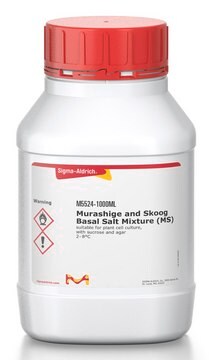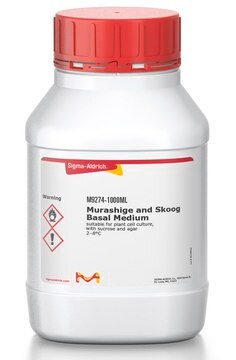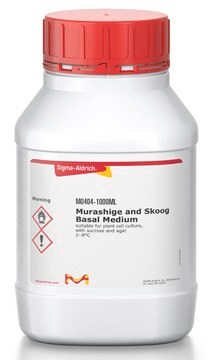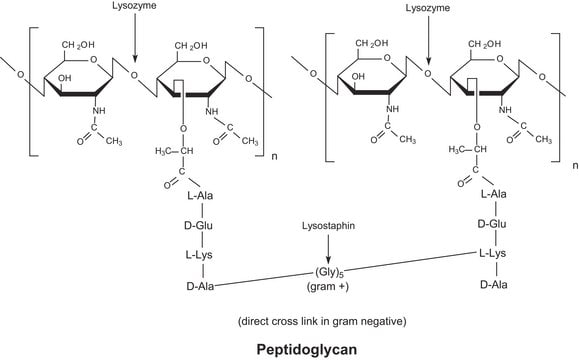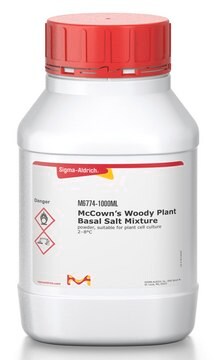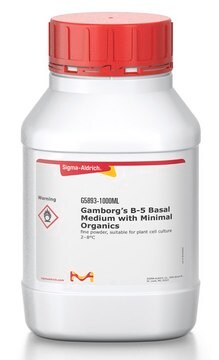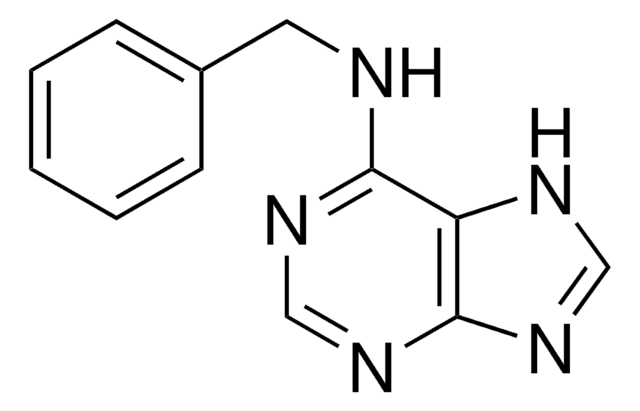M5519
Murashige and Skoog Basal Medium
powder, suitable for plant cell culture
Sinonimo/i:
MS0 Medium, MSO Medium, MS Basal Medium
Autenticatiper visualizzare i prezzi riservati alla tua organizzazione & contrattuali
About This Item
Prodotti consigliati
Stato
powder
Livello qualitativo
tecniche
cell culture | plant: suitable
applicazioni
agriculture
Temperatura di conservazione
2-8°C
Cerchi prodotti simili? Visita Guida al confronto tra prodotti
Descrizione generale
Murashige and Skoog medium is a widely used plant tissue culture growth medium. M&S Basal Medium contains macronutrients that include high levels of nitrate and organic additives such as agar, sugars, vitamins and growth regulators. Important growth regulators frequently added to M&S include IAA (auxin/morphogen) and the Kinetin (cytokinin/cell division promoter).
Applicazioni
Murashige and Skoog medium has been used in plant tissue culture medium for plant transformation study.
Formula variabile
With the macro- and micronutrients, and vitamins as described by Murashige and Skoog (1962).
Media Formulation
Media Formulation
Quantità
Formulated to contain 4.4 grams of powder per liter of medium.
Nota sulla preparazione
Murashige and Skoog medium can be reconstituted from powder or by combining products that are major components of complete M&S medium, such as macronutrient mixtures and vitamin mixtures. Murashige and Skoog medium (M5519) contains the micronutrients and vitamins of the original classic formulation. It can be supplemented with sucrose, agar, auxins (IAA) and cytokinins (Kinetin) to generate a complete medium for growth plant tissue culture.
Prodotti correlati
N° Catalogo
Descrizione
Determinazione del prezzo
Avvertenze
Warning
Indicazioni di pericolo
Consigli di prudenza
Classi di pericolo
Eye Irrit. 2 - Ox. Sol. 3
Codice della classe di stoccaggio
5.1B - Oxidizing hazardous materials
Classe di pericolosità dell'acqua (WGK)
WGK 2
Punto d’infiammabilità (°F)
Not applicable
Punto d’infiammabilità (°C)
Not applicable
Scegli una delle versioni più recenti:
Possiedi già questo prodotto?
I documenti relativi ai prodotti acquistati recentemente sono disponibili nell’Archivio dei documenti.
I clienti hanno visto anche
Suji Somasundaram et al.
Plant & cell physiology, 61(7), 1321-1334 (2020-05-08)
HKT1;5 loci/alleles are important determinants of crop salinity tolerance. HKT1;5s encode plasmalemma-localized Na+ transporters, which move xylem Na+ into xylem parenchyma cells, reducing shoot Na+ accumulation. Allelic variation in rice OsHKT1;5 sequence in specific landraces (Nona Bokra OsHKT1;5-NB/Nipponbare OsHKT1;5-Ni) correlates
M Guan et al.
Journal of experimental botany, 66(1), 203-212 (2014-10-16)
Nitrogen (N) remobilization from reserves to sinks is essential for seedling establishment and seed production. Cytosolic glutamine synthetase (GS1) is up-regulated during both seed germination and seed filling in plants. However, the specific roles of the individual GS1 isogenes with
Ajay Kumar et al.
BMC genomics, 13, 597-597 (2012-11-07)
Development of a high quality reference sequence is a daunting task in crops like wheat with large (~17Gb), highly repetitive (>80%) and polyploid genome. To achieve complete sequence assembly of such genomes, development of a high quality physical map is
In vitro assay for ABA 8'-hydroxylase: implications for improved assays for cytochrome P450 enzymes.
Joan E Krochko et al.
Methods in molecular biology (Clifton, N.J.), 773, 113-134 (2011-09-08)
In vitro assays for cytochrome P450 enzymes developed from plant-derived microsomal extracts have not been used extensively for the characterization and quantification of enzyme activities in plant tissues. We describe here an in vitro assay for abscisic acid (ABA) 8'-hydroxylase
Amr R A Kataya et al.
PloS one, 12(7), e0180478-e0180478 (2017-07-06)
Eukaryotic protein phosphatase 4 (PP4) is a PP2A-type protein phosphatase that is part of a conserved complex with regulatory factors PSY2 and PP4R2. Various lines of Arabidopsis thaliana with mutated PP4 subunit genes were constructed to study the so far
Il team dei nostri ricercatori vanta grande esperienza in tutte le aree della ricerca quali Life Science, scienza dei materiali, sintesi chimica, cromatografia, discipline analitiche, ecc..
Contatta l'Assistenza Tecnica.